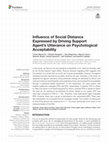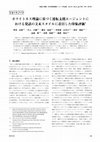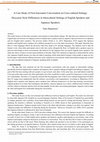Papers by Yuka Shigemitsu
Questioning and Answering Practices across Contexts and Cultures, 2021
東京工芸大学工学部紀要. 人文・社会編, 2008
Communication styles in different cultures affect rapport building in intercultural conversations... more Communication styles in different cultures affect rapport building in intercultural conversations. This paper looks at English and Japanese conversations, paying particular attention to the overall listener responses in those conversations. It is found that there are different sequencing rules between English and Japanese. These differences affect the communication as well as rapport building between native speakers and non-native speakers.

Frontiers in Psychology, 2021
In this study, we discuss the psychological acceptability of an utterance strategy used by the Dr... more In this study, we discuss the psychological acceptability of an utterance strategy used by the Driving Support Agent (DSA). Previous literature regarding DSA suggests that the adoption of a small robot as a form will increase acceptability. However, the agent’s utterance has been reported as a problem faced by the user. Therefore, in this study, we designed the agent’s utterance using politeness strategy as described by Brown and Levinson’s famous sociolinguistics and pragmatics theory and analyzed its acceptability through a participant-based experiment. In this experiment, we used positive and negative politeness strategies (PPS and NPS, respectively). In general, PPS is utilized to reflect the desire to be liked/recognized by others, whereas NPS is utilized to reflect the need for not wanting to be disturbed by others. Based on our results, PPS was rated high compared to NPS (n = 197). Therefore, many participants highly evaluated PPS. However, there was a group of participants w...
HCI in Mobility, Transport, and Automotive Systems, 2019
In this research, we propose a driving support agent which speak based on politeness theory. Driv... more In this research, we propose a driving support agent which speak based on politeness theory. Driving support agent is drawing attention as a new form of driving assistance for driving, but knowledge on effective utterance for driving support has not been established. The proposed agent selects an utterance based on the politeness theory in consideration of the age of driver, gender and driving characteristics. In the previous research, it has been pointed out that the driving support agent needs to be designed according to the driver’s age and ability. Experimental results suggest that agent using PPS is effective for improving familiarity between agent and participants. Since agent using NPS gave impression that it was carefully supporting, it was suggested that driver feel that they convey accurate information.

Proceedings of the 5th International Conference on Human Agent Interaction, 2017
In interpersonal interactions, humans speak in part by considering their social distance and posi... more In interpersonal interactions, humans speak in part by considering their social distance and position with respect to other people, thereby developing relationships. In our research, we focus on positive politeness (PP), a strategy for positively reducing the distance people in human communication using language. In addition, we propose an agent that attempts to actively interact with humans. First, we design a dialog system based on the politeness theory. Next, we examine the effect of our proposed method on interactions. For our experiments, we implemented two agents:the method proposed for performing PP and a conventional method that performs negative politeness based on the unobjectionable behavior. We then compare and analyze impressions of experiment participants in response to the two agents. From our results, male participants accepted PP more frequently than female participants. Further, the proposed method lowered the perceived sense of interacting with a machine for male participants.
Journal of Japan Society for Fuzzy Theory and Intelligent Informatics, 2018

Journal of Japan Society for Fuzzy Theory and Intelligent Informatics, 2019
In this paper, we propose an agent which selects utterance strategy according to driver's attribu... more In this paper, we propose an agent which selects utterance strategy according to driver's attributes and situation based on politeness theory. The proposed agent system considers attribute information such as age, gender, personality, driving experience and driving characteristics of the driver, and selects and supports highly receptive utterance strategies. Here, as a survey for the development of the proposed system, an impression evaluation experiment on a driving support agent was conducted using a moving picture reflecting driving support scenes. In particular, we focused attention on the difference of the end-of-sentence style which is a representation method of distinctive psychological distances in Japanese conversation. As a result of the experiment, it is suggested that agents using non-polite words may be effective for improving familiarity. On the other hand, the agent using honorifics gives the impression that it is cautious, suggesting the possibility that it feels that information is conveyed accurately.

This quantitative-analytical study compares question forms and functions in first conversations a... more This quantitative-analytical study compares question forms and functions in first conversations among non-acquaintances in 15 English conversations and 5 Japanese conversations. The English conversation data were videotaped in the United States, Australia, and the UK. The Japanese data were collected in Japan. The total length of the data is about 10 hours. All participants were male. The participants were instructed to conduct 30 minutes of first conversations with new acquaintances. Utterances with question forms and question functions that elicit new information from the asker were extracted and analyzed. Taking into account that Japanese and English have very different syntax, I compared question-answer patterns of both languages and examined the correlations between these syntactic-semantic categories of questions and the pragmatic types/functions of questions. The results of the data analysis showed how Japanese and English speakers use different types of question forms and functions in first conversations. In the English data, participants were inclined to request for new information with open-ended questions, such as wh-questions. They also asked questions pertaining to information of the recipient. In the Japanese data, this form of questions occurred less frequently. They tended to ask about simple facts that are not related to the other participants. It was also found that they hesitated to ask personal information.

This study focuses on first-time encounter conversations in intercultural settings. The data that... more This study focuses on first-time encounter conversations in intercultural settings. The data that were analyzed were three English data sets between two Japanese and two English native speakers and two Japanese data sets between two Japanese and two English native speakers. The previous studies (Tsuda et. al., 2015; Shigemitsu, 2015) suggest that Japanese speakers and English native speakers have different perspectives as to the ideal conversation. This paper illustrates how their L1 (first language) affects the discourse when they speak in FL (foreign language). The Japanese tend to take the listener's role; when other participants start to talk, they easily relinquish the floor. As English native speakers expect to gain new knowledge in most conversations, this behavior by the Japanese does not satisfy English native speakers. The study also shows evidence of some minor problems in the data. Many ESL situations in Japan have claimed that the reason why Japanese English learners are often not ideal at speaking within intercultural settings is that people in Japan are shy, but this paper claims that the different discourse styles exhibited in conversations within intercultural settings may on their own cause an underdevelopment of Japanese speaking skills in English. 2. Previous studies This study focuses on the conversational style differences between Japanese and English. The study was motivated by observable Japanese ESL (English as a second language) situations. Many of the learners of English have good ability in reading, grammar, and vocabulary. Some hardworking learners are also good at writing and listening. However, with speaking, the situation is different. According to Terauchi et al. (2008), based on their questionnaire to thousands of Japanese businessmen, "Japanese people tend to listen to the others talk and miss a timing to say their own opinion" and "Japanese people feel difficulties in objecting during the discussion." Moreover, Terauchi et al. (2008, 2013) concludes that Japanese behavior is influenced by their reserved attitude. On the other hand, Tsuda et al. (2015) provides refuting claims. The reason why Japanese people feel difficulty in speaking English, according to Tsuda, is due to the discourse style differences between English and Japanese. According to results of interviews of both English native speakers and Japanese speakers participating in conversation, some of the Japanese participants categorize themselves as listeners in conversation. They say that they like to listen to other people's stories and do not like to talk much. While listening, they seldom ask questions or do not object. A few participants say that asking questions is an impolite behavior. Therefore, their cultural norms may be in evidence as they speak in English. Otani, M., Iwata, Y., & Shigemitsu, Y. (2016) analyzed first encounter conversations by male participants. They picked up common features from their British data, American data, and Australian data. They focused on listeners and











Uploads
Papers by Yuka Shigemitsu